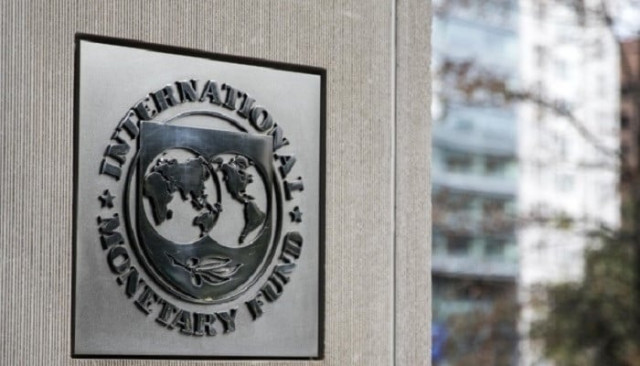IMF to release $1.1b after staff level deal
Pakistan agrees to roll out tax registration scheme for retailers, hike gas and power tariffs

The International Monetary Fund (IMF) on Wednesday announced a preliminary agreement with Pakistan for the release of $1.1 billion last tranche of a $3 billion bailout after Islamabad committed to roll out a compulsory tax registration scheme for retailers and further increase gas and electricity prices on the basis of need.
The announcement was made at the end of the six-day visit of the IMF mission to Pakistan that -- as anticipated -- conclusively ended without any hiccups.
The IMF staff and the Pakistani authorities have reached a staff-level agreement (SLA) on the second and final review under the country’s Stand-By Arrangement (SBA), subject to the approval of the IMF’s Executive Board, said the global lender in a press release.
Upon approval, Pakistan will have access to around $1.1 billion, it added.
The IMF said given the timing of the second mission -- immediately following the formation of the new cabinet -- it expected the review to be considered by its board in late April.
Earlier, the IMF Board was tentatively scheduled to take up Pakistan’s case at the beginning of the next month.
Pakistan’s performance in achieving the programme targets remained commendable and a key role was played by Finance Secretary Imdad Ullah Bosal as well as State Bank of Pakistan (SBP) Governor Jameel Ahmad in the successful conclusion of the $3 billion bailout package.
However, the SBA also led to a significant increase in the burden on the people in the shape of higher taxes on the salaried class and an exorbitant hike in the prices of fuel, gas and electricity.
Finance Minister Muhammad Aurangzeb on Wednesday briefed the federal cabinet on the outcome of the IMF talks, including a commitment to further increase the prices of gas and electricity.
The new government will “continue with the timely implementation of power and gas tariff adjustments to keep average tariffs consistent with cost recovery while protecting the vulnerable through the existing progressive tariff structures, thus avoiding any net circular debt accumulation in FY24,” according to IMF Mission Chief for Pakistan Nathan Porter.
Pakistan has committed with the IMF that it would keep the circular debt restricted to Rs2.310 trillion by June 2024 -- equal to last year’s level.
However, the flow of the debt has already reached Rs2.7 trillion, which the government plans to reduce to the agreed level through a combination of budgeted subsidies and tariff hikes.
An energy ministry official said the electricity prices might be jacked up by around Rs5 per unit to bring the debt down to the agreed levels.
Sources said Pakistan had assured the IMF that it would immediately roll out a new compulsory tax registration scheme for the retailers in five cities -- Karachi, Lahore, Peshawar, Quetta, and Islamabad.
Irrespective of the level of income, every retailer in these five cities will be required to register with the Federal Board of Revenue (FBR).
The scheme will be announced in a couple of days and enforced from April.
“The first tax payment is expected from July,” said a senior FBR official.
The retailers largely remain outside the tax net and pay a paltry sum in taxes.
The IMF has also made adjustments in the FBR’s monthly tax collection targets for the next three months.
The overall annual target may remain the same at Rs9.415 trillion or could be increased by about Rs3 billion.
The IMF has lowered April's target to Rs708 billion but it increased the monthly targets for the next two months.
For the month of May, the new tax target is Rs745 billion as against the earlier target of Rs811 billion. For June, the IMF has increased the target from Rs1.178 trillion to Rs1.254 trillion.
“The new government is committed to continue the policy efforts that started under the current SBA to entrench economic and financial stability for the remainder of this year,” said Porter.
“In particular, the authorities are determined to deliver the FY24 general government primary balance target of Rs401 billion or 0.4% of GDP, with further efforts towards broadening the tax base.”
The low tax base also remained an issue. However, FBR Chairman Malik Amjad Zubair Tiwana told the IMF that the tax authorities were on track to achieve the goal of adding nearly one million new taxpayers in the system.
The total number of taxpayers remained at 4.13 million against 5.9 million in the last tax year.
The FBR said the figure of 4.13 million was still high when compared with the position in March last year.
The IMF said that the SBP also remained committed to maintaining a prudent monetary policy to lower inflation and to ensure exchange rate flexibility. Besides, it added that the SBP also strived to ensure transparency in the operations of the foreign exchange market.
The agreement recognises the strong programme implementation by the SBP and the caretaker set-up in recent months. It also recognises the new government’s intentions for the ongoing policy as well as reform efforts to move Pakistan from stabilisation to a strong and sustainable recovery.
The IMF noted that Pakistan’s economic and financial position had improved in the months since the first review. It added that growth and confidence in the country continued to recover on the back of a prudent policy management as well as the resumption of inflows from multilateral and bilateral partners.
However, it continued that the economic growth was expected to be modest this fiscal year and inflation would remain well above the target.
For the ongoing fiscal year, the government had set the GDP growth target at 3.5% and the inflation at 21%.
However, the finance ministry informed the IMF that the economic growth rate might remain at around 2.6% while the inflation would be over 24%.
The silver lining for the government was the reduction in the current account deficit that the finance ministry had now estimated at $2.5 billion against the budget projections of $6.1 billion.
The IMF said the ongoing policy and reform efforts were required to address Pakistan’s deep-seated economic vulnerabilities.
It continued that the country faced these economic vulnerabilities amid the current challenges posed by elevated foreign as well domestic financing needs and an unsettled external environment.
Porter said Pakistan also expressed an interest in a successor medium-term IMF-supported programme with the aim of permanently resolving the country’s fiscal and external sustainability weaknesses, strengthening its economic recovery as well as laying the foundations for strong, sustainable, and inclusive growth.
He added that the discussions on the new programme “are expected to start in the coming months”.
The IMF has outlined the key objectives of the next programme, listing strengthening public finances including through gradual fiscal consolidation and broadening the tax base, especially in under-taxed sectors as well as improving tax administration to improve debt sustainability, creating space for higher priority development and social assistance spending to protect the vulnerable as its top priority.
The global lender has informed the foreign envoys that Pakistan must tax the construction, retail and wholesale sectors and there was also a need to revisit the National Finance Commission award to compel the provinces to increase their own tax collection.
The IMF said restoring the energy sector’s viability by accelerating cost reducing reforms including through improving electricity transmission and distribution, moving captive power demand to the electricity grid, strengthening distribution company governance and management, and undertaking effective anti-theft efforts will be the second objective of any new bailout package.
The global lender said among the other priorities were returning inflation to target, with a deeper and more transparent flexible foreign exchange market supporting external rebalancing and the rebuilding of foreign reserves.
The next programme will also focus on promoting private-led activity, removal of distortionary protection, advancement of state-owned enterprises (SOEs) reforms to improve the sector’s performance, and scaling-up of investment in human capital to make growth more resilient as well as inclusive, enabling Pakistan to reach its economic potential.


















COMMENTS
Comments are moderated and generally will be posted if they are on-topic and not abusive.
For more information, please see our Comments FAQ